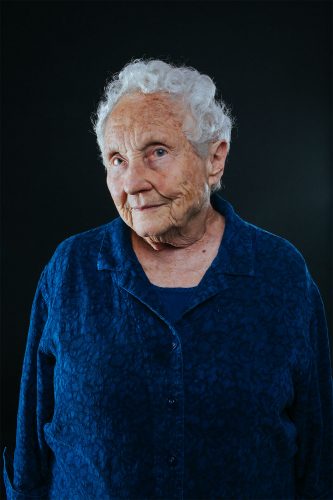
For the better part of 24 years, Betty Taylor spent every other Monday night at Eugene City Council meetings. Whether they were held at the former Eugene City Hall, Lane County’s Harris Hall or virtually on Zoom, Taylor was there.
Now 95 years old, Taylor chose to step down and not seek re-election in 2020. Newer Ward 2 resident Matt Keating was elected to take over the position, and was not endorsed by Taylor. He was sworn into office in early January. Reflecting on her six-term City Council career — the longest one in Eugene history — Taylor says there were good moments and accomplishments, but also issues the council still needs to work on.
She spent much of her time on council as a liberal voice, sometimes standing alone on issues such as objecting to tax breaks on wealthier developers, but in the past year sided multiple times with Eugene’s more conservative councilor, Mike Clark on issues such as multi-unit housing laws.
Before politics called, Taylor was an English teacher, earning her doctorate in English from the University of Oregon. She moved to Eugene in 1979 and bought her house in south Eugene several years later. Taylor ran for council in 1996 after Barbara Keller decided not to seek re-election.
Taylor picked up the petitions needed to become a candidate and thought about it, ultimately deciding to throw her name into the hat in the hope that she could change things.
“I decided I would speak up for the people who don’t have a public voice,” Taylor says. She never had any ambitions or desire to run for other political offices, local or otherwise. Over her years of running she was often endorsed by fellow city councilors, former Mayor Kitty Piercy and former Oregon 4th District Congressman Jim Weaver.
Taylor says she was consistently against tearing down parts of the city. In 2007 she teamed up with citizens to advocate against measure 20-134, which would have increased the debt for Downtown Urban Renewal Plan, allowing for corporate retail space downtown. In 2016 Taylor voted alongside then-Councilor George Brown against selling Kesey Square, at the time “officially” named Broadway Plaza.
“There has been too much destruction in this city anyway,” Taylor says. “We have a teardown society.”
Taylor was also against the 2014 teardown of City Hall, which has still not been rebuilt. She says when she was in her late 80s then-Eugene City Manager Jon Ruiz promised her that they would have a City Hall by the time she was 90.
A few years later, Taylor told Ruiz that she wasn’t 90 yet. The former city manager was confused, reminding her that they had celebrated her 90th birthday recently.
“I told him ‘Well we don’t have a City Hall,’” Taylor says, adding that she believes more in repairing and reusing instead of tearing down.
Another notable action from Taylor’s City Council career is her work in helping save the Amazon Creek Headwaters. The council voted in 2014 to purchase two plots of land containing main branches of Amazon headwaters in south Eugene and add them to the Ridgeline Trail System. The total acquisition was 26 acres.
Taylor says protecting neighborhoods was a big priority. She advocated for more regulation of short-term rentals over the last few years, because she says they have destroyed the availability of moderate priced houses in the community. Taylor isn’t opposed to short-term rentals, she says, but thinks they at least need to be owner occupied.
The council passed an ordinance in 2020 that required short-term rental owners to register their rentals. Taylor says that the action was pointless and she was the lone vote against it, because “It didn’t matter anymore.”
“I even got an email from a man who lives in Paris and owns a house in my ward,” she says. “It destroys neighborhoods, too.”
Taylor has also opposed Oregon HB 2001, which requires every Oregon city of more than 10,000 residents to allow multi-unit housing in any residential neighborhood within the urban growth boundary.
The bill usurps cities’ rights and destroys zoning, she says. Clark agreed with Taylor on the subject. She says Clark knows people who plan to buy up housing so they can tear it down and build more condensed units.
“The state should be establishing homeless shelters,” Taylor says. “People move around but the land doesn’t.” She adds that there needs to be a shelter downtown, explaining that if people had a place to sleep and keep their stuff, it would make it easier for them to access services.
Taylor says there are still several issues she wants to see the new City Council address.
“I hope for some really strong actions to combat climate change,” Taylor says. “And I hope that we will persuade the state to pay for homeless shelters, and I also would like to see the city become more walkable.”
Because of the pandemic, Taylor says she can’t make many plans for her retirement, though she does hope to travel to the coast and make more train trips. Now that she doesn’t have Monday night City Council meetings, she has the time.